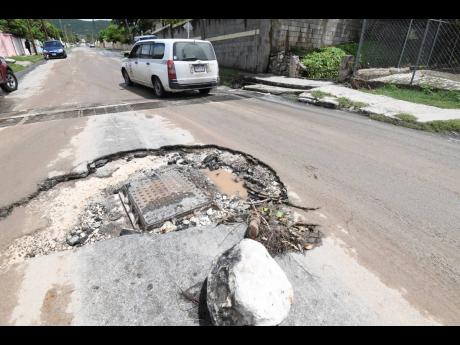Shift in weather pattern putting pressure on infrastructure – Holness
Prime Minister Andrew Holness has noted that the island’s infrastructure has become obsolete and is not able to withstand current weather events.
“Jamaica is now experiencing longer and more intense periods of drought, followed by shorter and more vigorous rainfall in sections of the island that were previously not prone to such heavy rains. This shift has been overwhelming the existing infrastructure and resulting in flooding,” he said in a press release yesterday.
His statement came a day after the Intergovernmental Panel on Climate Change (IPCC) issued a report highlighting the urgency for coordinated action to address the unparalleled changes in the ocean and in frozen regions.
To date, the ocean has taken up more than 90 per cent of the excess heat in the climate system, and sea levels are currently rising more than twice as fast as they did in the 20th century.
The IPCC was established by the United Nations and has 195 member governments, including Jamaica.
IPCC Chair Hoesung Lee explained that if countries reduce emissions, the consequences for people and their livelihoods would still be challenging but more manageable for the most vulnerable.
“The open sea, the Arctic, the Antarctic, and the high mountains may seem far away to many people, but we depend on them and are influenced by them directly and indirectly in many ways – for weather and climate, for food and water, for energy, trade, transport, recreation and tourism, for health and well-being, for culture and identity,” Lee said.
The IPCC warns that ocean warming, loss of oxygen, and changes in nutrient supplies are already affecting the distribution and abundance of marine life.
“In the future, some regions, notably tropical oceans, will see further decreases, and communities that depend highly on seafood may face risks to nutritional health and food security,” the report said.
The report also provided information to empower governments to strategise and take urgent action.
It suggested that strongly reducing greenhouse gas emissions, protecting and restoring ecosystems, and carefully managing the use of natural resources would make it possible to preserve the ocean and the frozen regions.
“The more decisively and the earlier we act, the more able we will be to address unavoidable changes, manage risks, improve our lives, and achieve sustainability for ecosystems and people around the world – today and in the future,” said Debra Roberts, Co-Chair of IPCC Working Group II.
Prime Minister Holness spoke at a United Nations forum yesterday on two critical topics: ‘Financing for Development’ and ‘Moving to Fill the Climate Action and Sustainable Development Goals Financing’.
“I will be continuing my advocacy for developed countries to fund climate adaptation and mitigation for countries such as Jamaica and other small-island developing states so that we can put in place the infrastructure that can withstand these adverse climatic events,” he said.
Melting ice, rising seas
- Sea level is currently rising more than twice as fast (3.6mm per year)
- Increasing rate of sea level rise because of melting glaciers and ice sheets in polar and mountain regions
- Expansion of the warmer ocean
Major changes in high mountains affecting downstream communities
- Increased hazards through landslides, avalanches, rockfalls, and floods
- Reduced water availability and quality downstream
- Impact on agricultural sector and hydropower
- Changes in water availability will affect people in high mountain regions and also communities much further downstream.
More frequent extreme sea level events
- Increase in the frequency of extreme sea level events that occur during high tides and intense storms
- Exposure to escalating flood risks
- Some island nations are likely to become uninhabitable due to climate-related ocean events.

